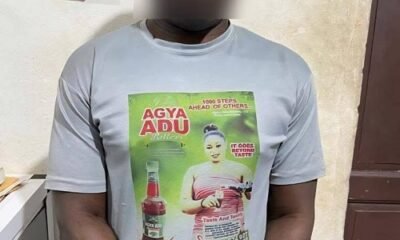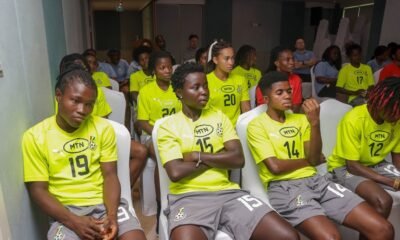News
Ghanaian nurse Naomi Oti vies for global nursing prize to support health delivery

An oncology nurse specialist and Head of Nursing at the National Radiotherapy Oncology and Nuclear Medicine Centre, Korle-Bu Teaching Hospital, has been named one of the top 10 finalists in the prestigious ‘Aster Guardians Global Nursing Award’ out of over 100,000 entries worldwide.
Naomi Oyoe Ohene Oti, is one of only two Africans to make the final shortlist, and now needs public votes to bring home a historic win for Ghana and Africa.
This was contained in a statement copied to The Spectator in Accra on Tuesday.
According to the statement, currently, the oncology nurse specialist is vying for a cash prize of $250,000 together with other competitors across the world to enable her expand her work in cancer education, mentorship, and care across Africa.
At the National Radiotherapy Oncology and Nuclear Medicine Center, the statement said, she has championed equity in cancer outcomes, pioneered specialist nurse training, and transformed patient care.
“Under her leadership, over 70 oncology and breast care nurses have been trained,” it added.
It mentioned that, Naomi has worked with leading global institutions including the Cross Cancer Institute (Canada) to bring high-quality oncology education to Ghanaian nurses.
According to the statement, she had played a key role in developing the country’s postgraduate oncology nursing curriculum and has mentored more than 48 nurses across Africa.
“Her commitment to building capacity is helping to raise a new generation of empowered African oncology nurse leaders’’.
“Her influence reaches the international stage through her work with the African Organisation for Research and Training in Cancer (AORTIC), the International Society of Nurses in Cancer Care (ISNCC), and ASCO’s global faculty’’.
The statement said Ms Oti co-leads research initiatives and policy development efforts that integrate African perspectives into global oncology practices.
It further mentioned that the Nurse Specialist’s groundbreaking research on breast cancer risks among African women has reshaped early detection strategies adding that “her contributions to clinical trial protocols have enhanced patient engagement and data integrity across multiple international studies.”
Ms Oti has received numerous national accolades, including the Ghana Ministry of Health Excellence Award and the Dr Dorcia Kisseh International Award from the Ghana Registered Nurses and Midwives Association.
Ghanaians have been urged to vote for Ms Oti through https://apply.asterguardians.com/voting
By Esinam Jemima Kuatsinu
News
Man sentenced to 25 years for robbery at Manso Akwasiso

A 30-year-old man has been sentenced to 25 years imprisonment with hard labour by the Bekwai Circuit Court for his role in a 2022 robbery at a mining site at Manso Akwasiso in the Ashanti South Region.
The convict, Dominic Ofori, also known as Fanta, was arrested on 16th February 2026 after years on the run. He pleaded guilty before the Bekwai Circuit Court to robbery contrary to Section 149 of the Criminal Offences Act, 1960 Act 29, and was accordingly sentenced to 25 years imprisonment with hard labour.
On March 20, 2022, the Manso Adubia District Police received intelligence that a group of armed men from Manso Abodom were planning to attack a mining site at Manso Akwasiso to rob the owner of gold concentrate. Acting on the information, police mounted a coordinated operation and laid an ambush at the site.
At about 5:30 pm the same day, four-armed men arrived at the site, fired indiscriminately, and robbed the miners of their gold concentrate. The police team on surveillance intervened, resulting in an exchange of gunfire.
Three of the suspects, Abu Abubakar, Musah Latif, and Gideon Takyi, sustained gunshot wounds and were pronounced dead on arrival at St Martins Catholic Hospital at Agroyesum. Dominic Ofori escaped at the time but was later arrested and put before the court.
The Ashanti South Regional Police Command has assured the public of its continued commitment to combating violent crimes and bringing offenders to justice.
News
Ashanti police arrest man for publishing false news on TikTok

The Ashanti Regional Police Command has arrested 45-year-old Isaac Boafo, also known as “Duabo King,” for allegedly publishing false news intended to cause fear and panic.
Police said the arrest follows a viral TikTok video in which Boafo claimed that four officers at the Central Police Station in Kumasi engaged in inappropriate conduct with commercial sex workers during night patrols in Asafo.
Officers from the Police Intelligence Directorate (Ashanti Region) apprehended Boafo after receiving intelligence about the video.
During questioning, he admitted to creating the video to attract views and engagement online, and acknowledged that he could not prove the allegations.
Boafo also admitted making comments about the President of the Republic for content purposes and could not defend those statements.
He has been formally charged and is in detention as investigations continue.
The Ashanti Regional Police have warned the public against publishing or sharing false information on social media, noting that such acts can cause fear, panic, and damage reputations.
They said anyone found engaging in similar conduct will face legal action.
By: Jacob Aggrey














